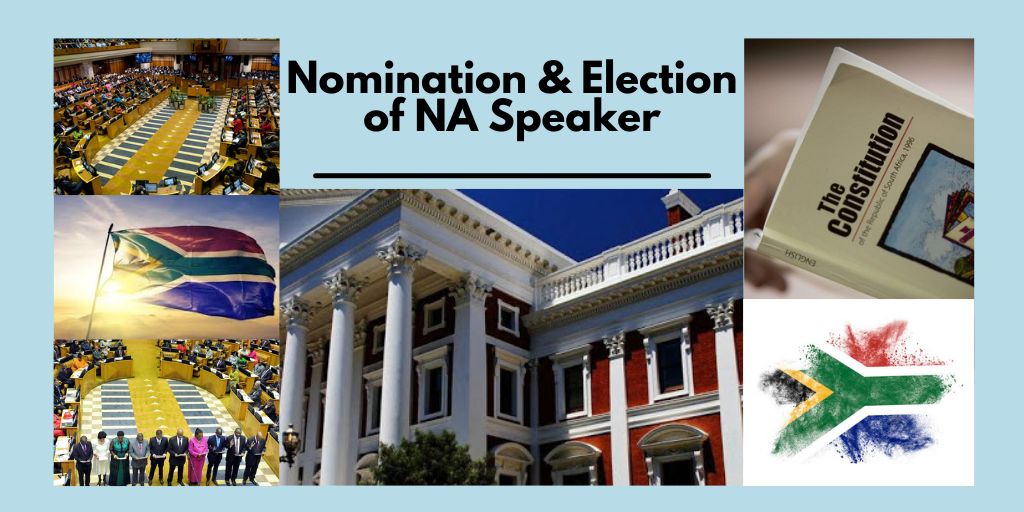Nomination and Election of Speaker

The National Assembly Programme Committee (NAPC), at its sitting yesterday morning, provisionally scheduled Thursday, 19 August for election of a new Speaker. The provisional date is subject to confirmation by the Office of the Chief Justice. The Chief Justice, or judge designated by him, must preside over the election of the new Speaker.
[The Role of Speaker of the National Assembly]
The Speaker is elected among Members of the National Assembly in terms of constitutional provisions in section 52, in Part A of Schedule 3, as well as Election Rules made by the Chief Justice.
Election procedure
Per the procedures stipulated by the Constitution and Rules, in the event that more than one nomination for the position of Speaker is received, the ensuing vote should be by secret ballot.
During the NAPC meeting, Parliament’s Secretariat gave assurances that all preparations for Thursday vote were being carried out on the assumption that more than one candidate may be nominated for election as Speaker. By its nature, a secret ballot procedure would require Members’ physical presence in the NA chamber to cast their vote as prescribed by the Rules.
However, owing to COVID-19 social distancing protocols, the maximum number of MPs that can be accommodated in the chamber will be 167. It was proposed that the balance of Members to be accommodated physically could be:
-127 Members in the NA chamber public galleries
-92 Members in E249 (video link)
-24 Members in the Officials Bay in the NA chamber; however it was not expected that 400 Members would attend
Members will be seated in each venue based on alphabetic listing starting with the NA Chamber. NAPC Members emphasised the need for some flexibility to allow for Chief Whips, and party leaders, to be present in the Chamber to assist in overseeing the voting. Members names will be called from the voters roll in batches of 10 to cast their votes. Members from the gallery and E249 would be ushered into the Chamber in groups of 10. There would be 3 voting booths located on the floor of the Chamber, adequately socially distanced. Ballot papers are printed only once the nominations are made. These are the arrangements should there not be a hybrid sitting.
Majority of Members were satisfied with the extent of preparations thus far, and wanted to know whether the secretariat had explored the possibility of decentralising the process so that, for example, MPs in KZN could meet in Durban to participate. The vote could still be secret while accommodating the physical participation of more Members without necessarily having to travel to Cape Town. This would be cost saving for Members who will have to travel to the Cape Town precinct from their respective provinces, and would ensure compliance with COVID-19 protocols. This especially in light of the high COVID-19 infection rates in Cape Town. The NFP also called for a hybrid model to accommodate some MPs virtually. The ANC’s Hope Papo interestingly highlighted that earlier in the week, a new Joburg Mayor was elected physically in the City of Joburg.
However, the DA Chief Whip felt MPs should attend the vote physically at the seat of the national legislature. It may then be arranged that MPs unable to travel, possibly owing to serious comorbidities or COVID-19 symptoms, connect virtually. “Showing the public that life must go on in the midst of COVID will instill some sense of relief and pride in the country- when MPs are seen to be doing their job, and doing so carefully”, said Ms Mazzone. Parliament is not restricted to the ‘50 people indoor’ lockdown regulation as it is a workplace.
Some Members disagreed with the proposal to decentralize the process. Its either Rules are amended or followed to the letter. FF+’s Mr Mulder added the Rules cannot be changed midstream, the NA should proceed in terms of current practices. He further said that parties that want to get their nominees in should ensure they have their Members in the House
The ANC’s Chief Whip suggested that the process would be much more streamlined if the Rules allowed for nominations to be made beforehand. She said then simply voting could take place on the day instead of waiting to hear how many candidates would be nominated. The DA agreed saying the Rules should be looked into and amended to make provision for the future and prevent all the detailed work of not having to print ballot papers on the day.
Mr Masibulele Xaso, Secretary to the National Assembly, said the Independent Electoral Commission in conjunction with Parliament is exploring the feasibility of secret balloting on virtual platforms. The system has not been tested prior, especially on such a big stage. It is accepted that some MPs might not be able to physically attend the vote but those that can, should be encouraged to do so as the voting threshold was not extraordinary. The Acting Speaker said this was part and parcel of the new ways in which the national legislature will carry out its work.
The Acting Speaker said the NA would give consideration to proposals to accommodate Members who will not be able to make it to the Cape Town precinct on voting day.
Rules of Election
About this blog

"That week in Parliament" is a series of blog posts in which the important Parliamentary events of the week are discussed.
We host the latest posts of this blog, written by People's Assembly. You can find more on PA's blog.
About this blog

"That week in Parliament" is a series of blog posts in which the important Parliamentary events of the week are discussed.
We host the latest posts of this blog, written by People's Assembly. You can find more on PA's blog.
